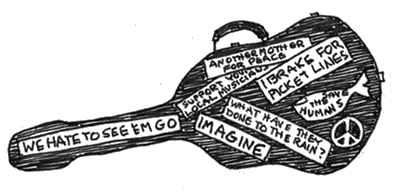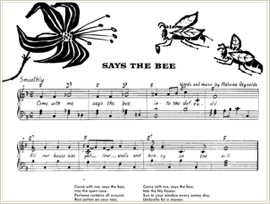


I
was online this morning to get the weather via sfgate.com, my local
paper’s online presence, and got distracted by an article, and then
another, and twenty minutes later woke up and got the weather and yes,
it was okay to hang the washing out. But afterwards I realized that in
the World-Wide Web we have externalized “monkey mind,” (the Zen term for
that part of our mind that goes on its merry way, leaping nimbly from
topic to topic, when we are trying to turn it off to meditate or sleep
or remember to get off the freeway at an unaccustomed ramp). And on the
Web we are leaping around in a virtual mind holding vast realms of
information even less relevant to the task at hand than our own mind
unfolds.
Then
my friend Judy called from Big Timber, Montana, where she lives, and
told me she read in the Billings Gazette that the honeybees are
disappearing. Not just being found dead in their hives from mites and
pollution, I knew that, but flying away and not coming back. What I also
didn’t know is that some beekeepers in Montana and Colorado pack up
their bees in the early spring and truck them to California to pollinate
the almond orchards and then back to the high country to pollinate
alfalfa in the summer. Maybe we are overworking them and they are going
away to form a union? Nobody knows. I do know that pesticides get an
okay from the government when the run-off doesn’t kill the salmon, but scientists have found that
the non-fatal pollution may still be enough to ruin their sense of
smell, so they can’t find their spawning areas or avoid predators. Maybe
the bees can’t make a bee-line any more. Maybe they are as lost and
confused as we are.
“And
the bees,” Judy added “pollinate...” I jump in, “every third bite we
eat. I wrote a song about that. I’ll send it to you.” I sent her the
words by email. She wrote back asking what the tune was. I emailed her
that I had one but I wasn’t entirely happy with it. She called. She had a
tune in her mind as she read the words and was hoping...”Fine,” I said,
“go for it.” So we have another collaboration coming up. She’s changing
the chorus lyrics a little. Fine too. And this one also can go on that
someday CD we are doing together along with our first couple of
collaborations. Meanwhile, read The Forgotten Pollinators
by Stephen L. Buchmann and Gary Paul Nabhan (Island Press, 1996). Not
just about the birds and the bees (and the moths and hummingbirds and
bats and beetles), but about various cultures’ relationship to them.
Woo-hoo! I just read another article about bees and the experts are
speculating that the bees may be stressed from all this trucking
around. And yet, these days we evidently can’t eat without transporting
bees. During this bee shortage, almond growers are bringing in bees from Australia.
So in addition to writing “For Every Third Bite, Thank the Bees,” maybe
I need to write “Buzzing Round the Picket Line.” Then Judy emails
that she has sung “For Every Third Bite” to some kids she knows and
they were buzzing right along on the chorus.
But
back to the Web: I just realized that in all this talk about how
information wants to be free and us songwriters should be happy to have
our songs pirated via the Web—think of the exposure, and to hell with
copyright—nobody is mentioning that other intellectual property, the
patent. The big drug companies and the purveyors of genetically altered
seeds first ask not “Is it effective?” or “Is it safe?” but “Is it
patentable?” This is the trouble with herbal remedies—can’t patent them.
So
here I am, a homeowner living a couple of miles from my alma mater, the
University of California, and they are going into partnership with the
oil company formerly known as British Petroleum to build a better
termite. Well, not exactly, but they want to genetically alter the
microbes in a termite’s gut so they will more efficiently digest
cellulose (that’s what makes grass and trees and my wood frame house
stand up) so BP can make ethanol out of grass. And hold the patents, I’m
sure. Never mind that a large part of the plant kingdom is made up of
one-celled algae that don’t have any cellulose in them to begin with.
You know them. Pond scum. As in “Oil companies are lower than pond scum,
and changing their names won’t help.” Oh, but pond scum is not
patentable, it already exist in nature. So forget that. Except some good
folks are working on a scheme to set up some particularly oily algae
next to power plants and pipe the carbon dioxide the power plant
produces through the pond water (now in tubes) so the algae will grow
faster, thus producing biodiesel and sequestering carbon dioxide in one
fell swoop. Read all about it in the Christian Science Monitor.
I hope the process as a whole can be patented, so they can avoid
genetically altering anything and still make their money back. And, yes,
I am writing a song about it, in the voice of an alga. I’ve already
done a song from the point of view of a coral polyp, so why not? Maybe
I’ve invented nano-creativity. Can’t patent it, though.
©2007 by Nancy Schimmel
Comment
Alix Dobkin
Good
going, Nancy! When I first heard about bees disappearing I almost
collapsed with horror! The latest I’ve heard is that cell phones are one
of the culrits...also gm crops, as you can imagine. Love to Judy when
you talk to her in Big Timber, & naturally, love 2 U! XXAlix
Friday, April 20, 2007 - 11:52 AM


Thursday, March 22, 2007


MONKEY MIND






